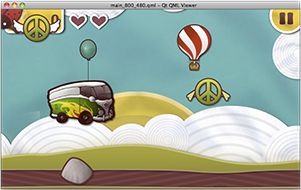Qt gains animation and UI stack
Mar 1, 2011 — by Eric Brown — from the LinuxDevices Archive — 5 viewsDespite Nokia's Qt-free plans to adopt Windows Phone 7, its Qt Software subsidiary released a high-level “Qt Quick” UI stack and other upgrades. New releases include an incremental 4.7.2 upgrade to the cross-platform Qt development framework, plus Qt SDK 1.1, Qt Creator 2.1, and Qt Mobility 1.1.1, following last week's alpha release of a Qt for Android (“Necessitas”) port.
Developer uncertainty in the Qt community continues after Nokia's recent partnership with Microsoft to support Windows Phone 7. Nevertheless, Nokia announced a series of updates and enhancements to Qt, including a high-level animation- and touch-enabled UI stack known as Qt Quick.
The Linux-ready, cross-platform Qt development framework received its last major upgrade in September with Qt 4.7. At that time, Nokia's Qt Software subsidiary announced Qt. Quick, but released only two building blocks for the software: a Javascript-based QML language and a "Qt Declarative" C++ module.

Flying Bus Game developed with Qt Quick
"Qt Quick is our fantastic new tool for creating lightweight, dynamic UIs and apps," writes Latvala.
In a separate blog post announcing the release of Qt Quick, Daniel Kihlberg, head of worldwide marketing and services for Qt, said, "Qt Quick (Qt UI Creation Kit) introduces exciting new functionality into Qt that lets developers and UI designers work together to rapidly create beautiful, fluid UIs and applications for any Qt platform, all based on our simple-to-learn QML language."
Qt Quick makes Qt more accessible to new developers and designers who are reluctant to learn or perform C++ coding, or those that find it challenging to create fluid touch UIs using Qt's current tools, writes Kihlberg. "We estimate that many, many developers fall into one of these two categories," he adds.
Aiming to calm developers concerned about Nokia's shift to Windows Phone 7, which will not use Qt, Kihlberg writes:
Qt Quick arrives at a time where on-going investments in Qt by Nokia and by community members continue. Developers can look forward to a strong Qt roadmap. As you may know, Qt is used by many leading consumer electronic companies — in addition to Nokia — that use Qt to deliver tens of millions of web-enabled devices such as printers, tablets, eBook readers, photo frames, Skype / video phones and more.
Based on developer feedback, Nokia decided to eliminate some confusion with its SDK offerings, according to Latvala's blog post. In particular, developers have questioned the merits of having two separate SDKs.
"This Qt SDK 1.1 beta is a precursor to a final 'combined' SDK that merges the previous desktop-focused Qt SDK and the mobile-focused Nokia Qt SDK," Latvala writes. "That package is the Qt SDK and this release is a beta of the upcoming version 1.1. We are carrying forward this one-SDK strategy."
In addition, Latvala says that the Qt SDK will contain all the Qt libraries, the Qt Creator IDE, and the rest of the tooling developers would expect, plus Symbian and MeeGo packages. The Qt SDK 1.1 package contains the following packages: Qt 4.7.2, Qt Creator 2.1, Mobility APIs (Qt Mobility 1.1.1), Qt simulator, Symbian toolchain, and the Madde toolchain for the Nokia N900 smartphone. Qt 4.7.2 and Qt Mobility 1.1.1 are said to be primarily maintenance releases.
Stated Mark Hatch, chief operating officer at ICS, "Qt Quick changes the whole paradigm of the development of embedded and mobile applications. We are able to create pixel perfect user interfaces in a tenth of the time it used to take."
Qt lives on in MeeGo, Ubuntu, WebOS, and now Android
Nokia's Qt development framework will not be used in Nokia's upcoming Windows Phone 7, according to Nokia executives at the Windows Phone 7 announcement last month. Meanwhile, only one MeeGo-based device, presumably an update to the Nokia N900, is still on the docket.
A Qt executive at the time was quoted by The Guardian as saying that Qt "will be a platform for Symbian … we will evaluate Qt for the low end. We aren't proposing to put Qt on Windows Phone 7 or to abstract Nokia devices via Qt on Windows Phone because that could fork development."
While Qt has been put on the backburner at its own parent company, the development framework has made some progress elsewhere. Intel has vowed to continue to push the Qt-powered MeeGo, despite the Nokia defection, and in January Canonical announced that it would adopt Qt for Ubuntu 11.04 ("Natty Narwhal"). Qt is also being used in HP's Linux-based WebOS operating system.
Now, a developer in the Qt community named BogDan Vantra has, independently of Nokia and Google, started creating a port for Qt on Android. Latvala notes that the Qt for Android port is "probably the most interesting initiative" in today's announcements.
The "Necessitas" (Qt for Android) port was released a week ago in alpha form. It uses the Qt Creator IDE to let developers manage, develop, deploy, run and debug Qt applications on Android devices, say the developers.
Nokia's Qt Software subsidiary was the result of Nokia's acquisition of Norway-based Trolltech in June 2008. Considering Nokia's tough financial situation, the Finnish phone giant may choose to sell Qt Software to another player looking for mobile software development help. Then again, Nokia might prefer to hold onto the team in case the Windows Phone 7 deal doesn't work out as planned.
This story draws in part upon a Darryl Taft report on Qt Quick in our sister publication eWEEK.
This article was originally published on LinuxDevices.com and has been donated to the open source community by QuinStreet Inc. Please visit LinuxToday.com for up-to-date news and articles about Linux and open source.